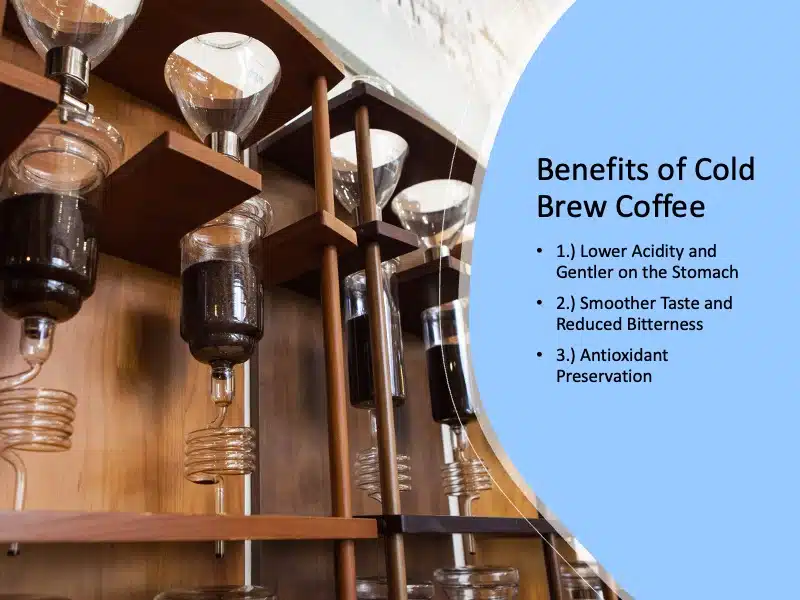Health Benefits of Cold Brew Coffee & Distinct Differences
Cold brew coffee has surged in popularity due to its smoother flavor and lower acidity compared to hot brew methods.
The extended brewing process and cold water extraction contribute to these distinct qualities, offering a coffee experience that is less bitter, more refreshing, and gentler on the stomach.
Recent studies have highlighted the potential health benefits of coffee, including improved cognitive function, reduced risk of certain diseases, and enhanced physical performance, with cold brew coffee offering a smoother, less acidic option that may be easier on the stomach for some individuals.
As a coffee lover and nutrition educator, I believe it is important for people to understand the benefits of cold-brew coffee, different brewing methods, and how it compares to regular hot-brewed coffee in terms of taste, health benefits, and chemical composition.
Benefits of Cold Brew Coffee

Cold brew coffee offers unique advantages over hot brewed coffee, including lower acidity, smoother taste, and a refreshing experience.
Whether made through the cold drip or immersion method, cold brew retains more antioxidants and provides a gentler option for coffee enthusiasts with sensitive stomachs.
With its rising popularity and versatile brewing options, cold brew coffee is a fantastic alternative for those seeking a less acidic and more flavorful coffee experience.
1.) Lower Acidity and Gentler on the Stomach
One of the most notable benefits of cold brew coffee is its lower acidity compared to hot brew coffee.
Research has shown that cold brew has a higher pH level, making it less acidic. The lower acidity reduces the chances of gastrointestinal issues, making it a preferable choice for those with sensitive stomachs.
2.) Smoother Taste and Reduced Bitterness
Cold-brewed coffee is smoother and less bitter than its hot-brewed counterpart, which is why I often order cold-brew from Dunkin Donuts or Starbucks if I need a coffee while traveling.
The long extraction process with cold water minimizes the release of certain acidic compounds, which significantly alters the flavor profile.
Research has also demonstrated that cold-brewed coffee tends to be sweeter and more balanced in flavor (Angeloni et al., 2019).
3.) Antioxidant Preservation
Interestingly, cold brew coffee retains more of its antioxidants when compared to hot brewed coffee.
This is because lower temperatures during extraction help preserve compounds that may be degraded by heat. Antioxidants, such as chlorogenic acids, have been shown to be more stable in cold brew coffee, enhancing its health benefits.
4.) Energy and Cognitive Boost
Caffeine is well-known for its energy-boosting effects, improving focus, alertness, and even enhancing physical performance.
Cold brew provides a steady and sustained release of caffeine, without the jittery spikes that some people experience with hot coffee.
Cold Brew Methods: Cold Drip vs. Immersion Brewing
There are two main methods of making cold brew coffee: cold drip and immersion.
Cold Drip Method
This method involves slowly dripping cold water through ground coffee over a long period, typically 8-12 hours. The slow drip allows for a controlled extraction, resulting in a cleaner, more concentrated coffee.
Cold drip coffee is known for its intense flavors and aromatic qualities.
Research suggests that cold drip coffee can preserve volatile compounds better than hot brew or immersion methods.
Immersion Method
The immersion method, commonly used for homemade cold brew, involves steeping coarse coffee grounds in cold water for 12-24 hours. This method is simple and yields a less concentrated brew with a smoother taste profile.
Studies indicate that cold brew produced using the immersion method tends to have higher sweetness and lower acidity compared to the cold drip method (Claassen et al., 2021).
Cold Brew vs. Hot Brew Coffee: Key Differences
When it comes to coffee, cold brew and hot brew offer distinctly different experiences, not just in flavor but also in chemical composition and health benefits.
While both methods extract the rich compounds that give coffee its unique profile, the temperature and brewing process lead to varying results in taste, acidity, and caffeine content.
Flavor Profile
Cold brew coffee’s lower bitterness and higher sweetness contrast sharply with hot brew coffee. Hot brew methods, which rely on rapid extraction at high temperatures, tend to produce coffee with a sharper, more acidic flavor.
A sensory analysis showed that cold brew coffee is often preferred for its floral notes and balanced sweetness, while hot brew coffee delivers more robust and bitter flavors (Batali et al., 2022).
Caffeine Content
Cold-brew coffee can contain just as much, if not more, caffeine than hot-brew coffee, depending on the coffee-to-water ratio, the amount of caffeine in the beans, and the brewing time.
Health Benefits
Both cold-brew and hot-brew coffees are rich in antioxidants, but cold-brew retains a higher percentage due to the reduced temperature during extraction.
Cold-brew coffee’s higher antioxidant levels make it a beneficial option for combating oxidative stress and reducing inflammation.
However, it’s essential to note that both brewing methods provide valuable health benefits when consumed in moderation.
How to Make Cold Brew Coffee
Making cold brew coffee at home is surprisingly simple. Here’s a step-by-step guide:
- Choose Your Coffee Beans: The best cold brew starts with quality beans. For the ultimate experience, Bizzy Organic Cold Brew Coffee is a top pick. Known for its smooth and sweet blend, these coarse-ground, 100% Arabica beans are specifically crafted for cold brew, offering a rich, non-bitter taste.
- Grind the Beans: Use coarsely ground coffee to prevent over-extraction, which can lead to bitterness. Pre-ground options like Bizzy’s are ideal, but if you prefer grinding at home, ensure the consistency resembles breadcrumbs.
- Mix Coffee and Water: Combine 1 cup of ground coffee with 4 cups of cold water. You can use a mason jar or a dedicated cold brew maker like the Takeya Cold Brew Maker, which is airtight and ensures easy brewing and storage.
- Steep: Let the mixture steep in your refrigerator for 12-24 hours. The longer it steeps, the stronger the flavor.
- Strain: After steeping, strain the coffee using a fine mesh sieve, cheesecloth, or the filter in your cold brew maker. You’ll be left with a concentrated cold brew that can be stored in your fridge for up to two weeks.
- Serve and Enjoy: Dilute the concentrate with water or milk to your liking, and serve over ice. For an extra treat, top with sweet cream or your favorite flavored syrups.
Tips for Perfecting Your Cold Brew
- Use Filtered Water: The quality of your water impacts the flavor of your cold brew. Filtered water is best, as it minimizes unwanted flavors from tap water.
- Customize the Strength: Cold brew concentrate can be diluted to taste. If it’s too strong, add water, milk, or plant-based milk alternatives like almond or oat milk.
- Store Properly: Cold brew concentrate can last up to two weeks in the fridge, but it’s best to enjoy it within 7-10 days for optimal freshness.
Best Cold Brew Coffee Maker
If you’re dedicated to creating the ultimate cold brew coffee, the BLARYETI Ice Drip Coffee Maker is an exceptional choice.
Combining modern aesthetics with functionality, this coffee maker features durable stainless steel and glass construction for a long-lasting and sophisticated design.
Its compact dimensions (3.9 x 9.2 inches) make it an effortless addition to your kitchen counter or a convenient option for travel.
The standout feature of the BLARYETI is its adjustable water flow system, allowing precise control over the extraction process.
This ensures a smooth, bold flavor that highlights the nuanced characteristics of your coffee beans.
With a 14-ounce capacity, it’s perfectly suited for coffee enthusiasts who prefer a manageable, straightforward setup.
The slow-drip method produces a rich, concentrated brew that can be savored as is or easily customized with water, milk, or ice to create a variety of refreshing cold coffee beverages.
Last update on 2025-04-15 / This article includes affiliate links/Images via Amazon Product Advertising API. I may earn commissions on purchases made through these links.
Best Cold Brew Coffee Beans
When it comes to selecting coffee beans for cold brew, Bizzy Organic Cold Brew Coffee stands out. The blend of 100% Arabica beans is coarsely ground and micro-sifted to provide the perfect cold brew every time.
Whether you prefer a smooth and sweet profile or a bold, dark roast, Bizzy offers a variety of flavors to suit your palate.
It’s crafted specifically for cold brewing, ensuring rich flavors without bitterness. Plus, the beans are USDA organic, making them a clean choice for coffee lovers.
Last update on 2025-04-15 / This article includes affiliate links/Images via Amazon Product Advertising API. I may earn commissions on purchases made through these links.





